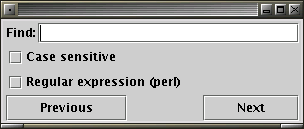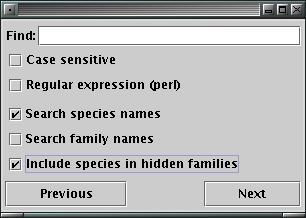Table Finders
Text finder

Text finders are available in tables that are displayed by the task "query
ticks".
- "Find:" Text field - enter the text that you seek.
- "Case sensitive" - Tick for case-sensitive search. This box is honored
by search for strings and searches for regular expressions.
- "Regular expression" - Tick to have the search string treated as
a perl regular expression rather than as a simple string.
A regular expression is a pattern rather than a literal string
of characters. Details are provided below.
Species finder

Species finders are available in dialogs in which you select species
for checklists and tick species that have been observed on trips and in
lists produced by the task "make species lists".
- "Find:" Text field - enter the name or a portion of the name to
be found.
- "Case sensitive" - Tick for case-sensitive search. This box is honored
by search for strings and searches for regular expressions.
- "Regular expression" - Tick to have the search string treated as
a perl regular expression rather than as a simple string.
A regular expression is a pattern rather than a literal string
of characters. Details are provided below.
- "Search species names" - Tick to search species names.
- "Search family names" - Tick to search family names.
- "Include species in hidden families" - If a species in a hidden family
matches the search request, the family will be expanded and the
species will be selected. Otherwise, only species in expanded families
will be searched.
Regular expressions
Regular expressions are patterns, and they are more flexible than plain
strings. To construct a regular expression start with the string that you
want, and add symbols that make it into a pattern. Most characters are
interpreted literally. Some symbols follow.
- ^ anchors a pattern to the beginning of a name. Examples:
- ^hawk - matches names beginning with hawk but not "nighthawk".
- $ anchors a pattern to the end of a name. Examples:
- red$ - matches "Phalerope, Red" but not "Sapsucker, Red-breasted".
- ^Emu$ - matches a name that is just "Emu" and nothing else.
- ? represents zero or one occurrence of the preceding letter. Examples:
- colou?r - matches color and colour
- * matches zero or more occurrences of the preceding letter. Examples:
- noguchi* - matches "noguch", "noguchi", "noguchii",
"noguchiii", etc.
- go*se - matches "gse", "gose", "goose", "gooose", etc.
- . represents any character. Example:
- r.d - matches any three successive letters that begins with
r and ends with d (e.g., "rad", "rbd", "rcd", ..., "r1d",
"r2d", "r/d", "r%d", ...)
- night.heron - matches "Night Heron", "Night-Heron" and many
unlikely possibilities.
- [] enclose alternative characters. Example:
- r[aeiou]d - matches "rad", "red", "rid", "rod", "rud"
- night[- ]heron - (note space after dash) matches "Night-Heron"
and "Night Heron"
- [Cc]huckwill - matches either "Chuckwill" or "chuckwill" in a
case-sensitive search
- \ escapes special pattern symbols so that they are interpreted as
characters rather than symbols. Example:
- p\. argentatus - requires that the letter p be followed by
a period
- island\? - matches "island?" but not "island"
Fair play
It is unfair to use regular expressions while playing the round-robin
game of elimination in which each person provides the name of a
bird that begins with the letter that is the final letter of the bird named
by the previous person.
Last update 8 September 2004

